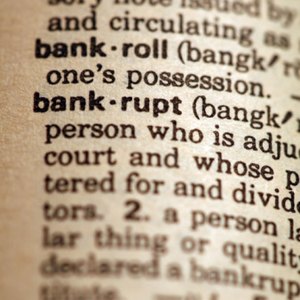
Filing for Chapter 13 bankruptcy allows a debtor to financially reorganize his debts and pay off outstanding debt through a court-ordered repayment plan. After a debtor has completed all his repayments, he is absolved of any remaining liability on his previous debts. The term "dropping out" refers to when individuals stop making their monthly payments under the Chapter 13 debt repayment schedule. This can be done at any time during the repayment plan, which generally last two to five years.
Talk to your bankruptcy attorney about dropping out. Make sure you understand the consequences of dropping out of your bankruptcy.
Discuss with your bankruptcy attorney your reasons for wanting to drop out. If you cannot afford the payments under the Chapter 13 bankruptcy repayment schedule, your attorney may be able to go back before the bankruptcy court and have the repayment plan adjusted. Dropping out of Chapter 13 bankruptcy should only be pursued if there are no other alternatives.
Ask your bankruptcy if you are eligible to file for a Chapter 7 bankruptcy instead.
Stop making your monthly repayments to the bankruptcy court. Once you stop making payments, you have effectively "dropped out."
Warnings
Dropping out of a Chapter 13 bankruptcy has serious financial and legal consequences. Most notably, the creditors can come after you again and foreclose on any property you have, as they did before the Chapter 13 bankruptcy was filed.
References
- U.S. Courts: Chapter 13 Bankruptcy
- Moran Law: What if I can't make the payments on my Chapter 13 plan?
- U.S. Courts. "Federal Court Finder." Accessed May 18, 2020.
- U.S. Courts. "Chapter 7 Means Test Calculation." Accessed May 18, 2020.
- U.S. Dept. of Justice. "LIST OF APPROVED PROVIDERS OF PERSONAL FINANCIAL MANAGEMENT INSTRUCTIONAL COURSES (DEBTOR EDUCATION) PURSUANT TO 11 U.S.C. § 111." Accessed May 18, 2020.
Warnings
- Dropping out of a Chapter 13 bankruptcy has serious financial and legal consequences. Most notably, the creditors can come after you again and foreclose on any property you have, as they did before the Chapter 13 bankruptcy was filed.
Writer Bio
Lindsay Nixon has been writing since 2007. Her work has appeared in "Vegetarian Times," "Women's Health Magazine" and online for The Huffington Post. She is also a published author, lawyer and certified personal trainer. Nixon has two Bachelors of Arts in classics and communications from the College of Charleston and a Juris Doctor from the New England School of Law.

